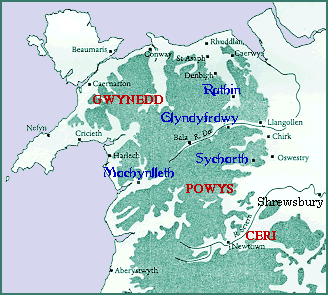 |
The revolt of Owain Glyndwr
Glyndwr's background
|
|
 Owain of Sycharth and Glyndyfrdwy Owain of Sycharth and Glyndyfrdwy
Owain came from a native Welsh
family, and could claim descent from all three of the major royal
houses that had dominated Wales before the Edwardian conquest
of 1282: through his father from the princes of north Powys;
and through his mother from the celebrated Lord Rhys of Deheubarth.
He was probably born sometime between 1354 and 1359. The family
was well off, with estates in Glyndyfrdwy (in the Dee Valley
between Llangollen and Corwen) and in Sycharch (near Oswestry). |
|
The family seemed to have adapted to English
rule. Owain’s grandfather had married into the Lestrange
family of Knockin, near Oswestry, one of the Anglo-Welsh families
of the Marches. His father had been the earl of Arundel’s
steward of Oswestry. He himself married c.1383 Margaret, daughter
of Sir David Hanmer, chief justice of the King’s Bench.
His early life had been similar to that of many English country
squires. At the age of 21 he had probably served at the Inns
of Court in London where he would have acquired a necessary background
in law. He also began a military career with service at Berwick-on-Tweed
in 1384, and he joined Richard II’s expedition to Scotland
in 1385. In 1387 he became a retainer of the earl of Arundel
and took part in the major naval victory at Cadzand, off Flanders. |
| |
 |
| |
However, the deaths of Hanmer in 1387 and Arundel
in 1397 deprived him of patrons who could have secured office
and advancement for him. He was not knighted for his services,
as others had been, and he was denied local office in Wales.
He could rightly feel a sense of injustice and frustration over
the way he had been treated. |
| |
This sense of injustice was common to many in
Wales at this time. Owain Glyn Dwr was descended from the last
princes of Wales; he and others were well aware of the fact,
which was reinforced by the many prophecies that were circulated
by the bards and others, calling for deliverance. |
 |
|
 |
|

 Owain of Sycharth and Glyndyfrdwy
Owain of Sycharth and Glyndyfrdwy